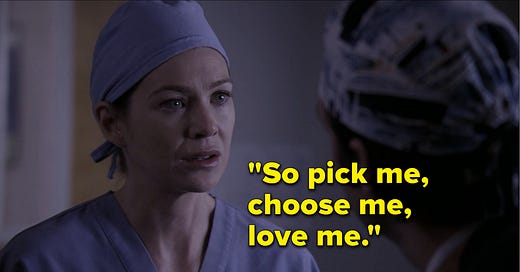'pick-me girls' are the new scarlet letters
Like a cheeseburger and cold beer? Pick-me. Too confident in yourself? Pick-me. Dress up for a date? Pick-me.
Are you a girl, woman, or femme? You may be entitled to compensation from the following people Elon Musk, Mark Zuckerberg, and every boy you knew during puberty.
“Pick-me girl,” defined as “a girl who seeks male validation by indirectly or directly insinuating that she is 'not like other girls,’” has become the ultimate insult — so insulting that girls and women all over the internet avoid that label like the plague. And rightfully so. That title comes with the consequences of relentless cyber-bullying, alienation from fellow women, and a potential internet cancellation.
I once made the mistake of making a dry and wholly sarcastic joke and posting it on my public TikTok account. It was a few years ago, but I remember it being along these lines: The original video said, “How do you know you’re pretty?” and I responded by saying “How could I not? I mean look at me.” Let me add that the video was accompanied by a long and sardonic laugh. The video gained a few hundred views in 20 or so minutes, not millions of views viral, but enough to get me my fair share of hate comments and labeled as a pick-me. Granted, the people commenting on my video were almost positively 13-18-year-old boys, but at that time I too was around 16 or 17. I didn’t deserve to be bullied because my (fairly obvious) joke didn’t land. The use of the term is not specific to one gender. Yes, women use it as an easy takedown of other women but it is just as often used by men — a different, more subtle way of outright calling her a bitch.
With the rush of misogynistic hate comments came a larger rush; a tsunami of kind and complimentary women and girls. Those are the comments I remember more when I think about that post. At this point and with the advantage of hindsight, I laugh at the threat I imposed to the internet by calling myself pretty.
Try to have any ounce of self-confidence and you’ll swiftly be branded as a pick-me — take it from me. With that comes Internet ridicule and anti-girls-girl allegations. Considering how non-trendy feminism was at my high school — I was called a “Feminazi” by at least five boys after I attended the 2017 Women’s March — it’s strange to witness feminism, or at least this brand of “feminism” gain popularity.
Yet, like most Internet phenomena, the “pick-me girl” epidemic folded in on itself. “Pick-me girl” went so “feminist” that it became… anti-feminist (one could argue it was anti-feminist from its inception). Girls-girl feminism and subsequently pick-me culture holds women to an unattainably high standard — no mistakes or slip-ups and absolutely no room for growth.
Since its onset, “pick-me girl” has been somewhat of a dog whistle. If a girl is labeled a pick-me, that gives everyone a free pass to be as misogynistic as they please. And the term has been used by men since its inception — But what does it take to be a “pick-me girl”? Anything and everything. Like football? Pick-me. Like a cheeseburger and cold beer? Pick-me. Too confident in yourself? Pick-me. Dress up for a date? Pick-me. The looming threat of being labeled as a “pick-me” and all the consequences that come along with it leads women to conceal facets of their identity — which makes it unfeminist. To the women who enjoy football, a cheeseburger and beer, getting dressed up, or simply being confident in themselves, you are not failing at anything, rather you are succeeding at pissing off the patriarchy — good for you. Women should be allowed to express their likes and dislikes freely and authentically without fear of having a scarlet “PMG” sewn onto their shirts.
How though, did we get to the point where women are expected to uplift and agree with every woman ever? It could be argued that this invisible pressure has been on women since the beginning of time, but looking at recent years, there are potential culprits. The name presumably originates from Grey’s Anatomy in a now-infamous scene where Meredith Grey (portrayed by Ellen Pompeo) says, “So pick me, choose me, love me” to a male love interest. Then there was the Girlboss-ification of feminism, where instead of collective and intersectional liberation, the sole focus is the (usually corporate) success of a singular woman — capitalism’s idea of equity. People need a scapegoat, no, rather, bigots need a scapegoat. And so the “pick-me” label was born and glommed onto women and girls, making misogyny even more palatable than it already is.
There is a broader issue behind women and girls being labeled as having “pick-me energy.” Why do we feel the need to seek male validation in the first place? We adopt the “pick-me energy” for a reason, it’s not out of the blue. Attracting the attention and validation of a man is as good as currency when living under a patriarchy, and separating oneself from the solidarity of womanhood is one of the avenues to do that. Look, I get it. It hurts like hell when a girl you call a friend, or even a stranger, puts you down to appeal to a man. That action is a betrayal of the supposed inherent camaraderie between women and girls. I thought we were supposed to be in this together — I hoped for us to be in this together.
Considering we exist under a system that thrives off of misogyny, more grace should be given to us for responding to that oppression. Is putting a fellow woman down a good or productive way to respond? Absolutely not, but that action should not result in a punitive and unrelenting punishment.
We also cannot pretend that every woman in life will be by your side considering that 53% of American white women voted for the white supremacist, rapist, fascist, all-around-piece-of-shit known as Donald Trump, in the 2024 U.S. Presidential election. I do not believe that those women deserve the consequences of a misogynistic system — no one does — but there must be an acknowledgment of the oppression they cause; a person can be oppressed and oppress others.
I love women. I love all the wonderful and authentic relationships I have with every woman in my life — I honestly don’t know what I’d do without them. I love myself. I want the freedom of calling myself pretty and posting that statement on the Internet without fear of being pitted against other women. The “conceited” angle comes with any expression of self-confidence expressed on the Internet; that’s just the nature of such a large platform with millions of people, but the double standard is glaring.
I don’t have to utterly adore every woman I encounter. Rather, I want to be able to disagree with, and hell, even dislike women I encounter. It’s an impossible standard set on us — approve of, love, admire, and agree with women, no exceptions. And if you don’t? God knows you’ll be met with the wrath of the Internet. It starts to seem like we as women, girls, and femmes can’t win. Perhaps we should stop trying to win a rigged game.
who wrote this?
I'm Audrey. My Substack, Confessions of a Fashion Fanatic, is a haven for all things fashion as well as broader social commentary --- culture, politics, and so much more --- if something strikes my interest, you better believe I'll write about it. My passion for fashion is what sparked my passion for writing, and both are constantly blossoming. I truly love the art of writing and all it brings to the world. You can find more of me and my work on my Instagram.








The term pick me has become so far removed from its original context. It baffles me that a joke about thinking you are very attractive could be seen as “pick me” when the term was originally meant to denote the ways in which girls throw other girls under the patriarchy bus for male approval. I think the problem lies in trying to diagnose particular actions (rather than a pattern of behaviours) as “pick me”.